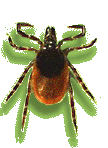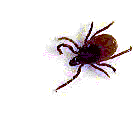

The deer or black-legged tick, Ixodes scapularis. Photos by John VanDyk, Department of Entomology, Iowa State University.
 Consider the tick. This parasitic insect lives such a revolting life that it's hard to find anything nice to say about them. It sucks blood from mammals for a living. It carries pathogens that cause illness -- Rocky Mountain spotted fever, Lyme disease, and now human granulocytic ehrlichiosis (HGE).
Consider the tick. This parasitic insect lives such a revolting life that it's hard to find anything nice to say about them. It sucks blood from mammals for a living. It carries pathogens that cause illness -- Rocky Mountain spotted fever, Lyme disease, and now human granulocytic ehrlichiosis (HGE).
This tongue-splitter of an infection causes aches and pains reminiscent of the flu. Untreated, it can damage the immune system and allow secondary infections (an infection that results from a weakening of the immune system caused by a pre-existing infection.) that are occasionally fatal.
In a new study, Jennifer Walls, a graduate student in pathology at Johns Hopkins University, found active or past infections of HGE in 20 of 43 white-tailed deer in Wisconsin. She found similar evidence in 6 of 80 black bears in California and Oregon. Both these animals are hosts for the deer tick. If these parasites subsequently bite a person or another mammal, they will transmit the disease.
That high proportion of infected animals in the wild raises the prospect that the lowly deer tick will transmit more human cases of HGE. "This finding suggests that many people in these areas may be at risk for HGE infection," Walls says, "and doctors and patients should stay alert to this possibility."
Unfortunately, that's easier said than done since HGE causes no trademark symptoms to distinguish it from flu. "Patients with ehrlichiosis start with very general, flu-like symptoms -- fever, headaches, muscle aches," says J. Stephen Dumler, Hopkins associate professor of pathology, who discovered the HGE bacterium in 1993. "Most doctors say, 'It's a virus. Go home and get some rest.' That's scary, because there's a special antibiotic that can cure patients in 24 to 48 hours if the infection is caught early."
(The Why Files covered antibiotic resistance in bacteria, if you'd care to look.)
And while HGE is not as bad as Lyme disease infection (also transmitted by deer ticks), and does not seem to cause the permanent destruction of the immune system caused by AIDS, it quite easy to treat, if identified early.
Stayin' inside, stayin' alive?
Is HGE just another reason to hole up in a darkened room and surf the net 24/7? Not really. Most cases are mild, and don't cause a dangerous decline in the immune system, says Walls.
To prevent infection, you could avoid places with low-lying plants where ticks prefer to congregate. To be honest, that sounds like a drag to the nature-lovers here at The Why Files. Instead, try wearing light-colored clothes, to make the little devils more visible. Use a tick repellent, and the extremely common-sense measure of removing ticks that manage to hook their fangs into you. Finally, if you feel flu-like after being tick-bitten, by all means tell your doctor. There's a good blood test to detect -- or eliminate -- HGE as the cause.
Want to meet the mosquito, another six-legged animal that will happily trade blood for pathogens?
-- Dave Tenenbaum


